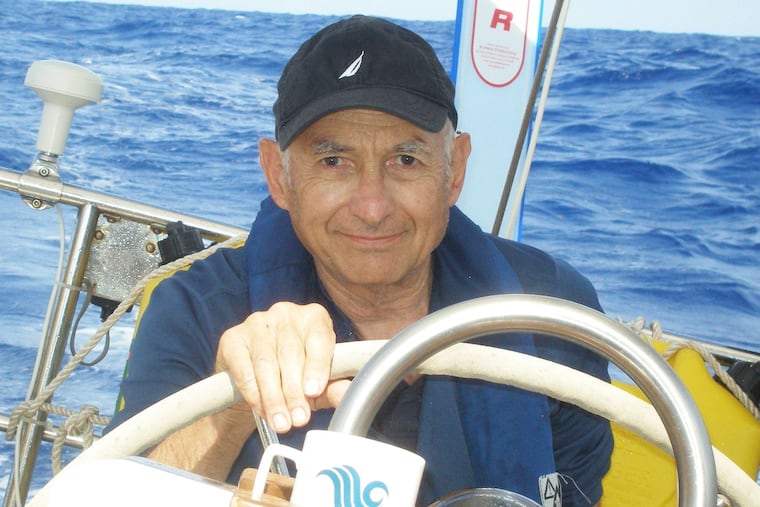Raymond F. Hopkins, Swarthmore professor emeritus of political science, world food policy pioneer, and author, has died at 84
He was "empathetic and compassionate when dealing with sensitive student issues," a colleague said. "That stance came from the deep caring he had for them."

Raymond F. Hopkins, 84, of Swarthmore, professor emeritus of political science at Swarthmore College, world food policy pioneer, government consultant, worldwide lecturer, author, and mentor, died Tuesday, May 23, of congestive heart failure and sepsis at Riddle Hospital in Media.
Professor Hopkins was a renowned expert on hunger, agriculture, famine, international aid organizations, and political economy. He joined Swarthmore in 1967 and served as director of the public policy program and three terms as chair of the political science department before retiring in 2007.
He not only taught classes on international politics, African politics, and food policy, but also collaborated with professors in other departments to create broad new courses that featured notable guest speakers, extensive field work, and internships around the world. He was so influential in his field that the college marked his retirement by hosting a two-day symposium on international politics.
“His generosity and love for teaching endeared him to students and colleagues alike,” Swarthmore president Valerie Smith said in a tribute.
Professor Hopkins mentored countless students, and the Hopkins International Public Policy Internship at Swarthmore is named in his honor. A fellow professor said: “He cared passionately about students, had a great sense of humor, and always had a twinkle in his eye.”
With funding from many foundations, Professor Hopkins studied hunger and food distribution systems in the United States, United Kingdom, Belgium, Canada, Egypt, Italy, Kenya, Thailand, and elsewhere. He lectured at conferences and seminars, and was a consultant for the U.S. government, United Nations, World Bank, and other global organizations.
He helped shape the 1990 U.S farm bill and was a delegate to the United Nations World Food Summit in 1996 and 2002. He championed government’s role in combating hunger and told worldhunger.org: “The belief that private sector efforts will respond to a reduction of government intervention at local, national and international levels is illusory. The crucial move is more effective government, not less government.”
Colleagues called him a problem-solver who left space for empathy and compassion in his conclusions and proposals. A friend said: “He was way ahead of his time.”
Professor Hopkins authored, coauthored, and edited several books, including 1978′s Global Political Economy of Food, 1980′s Global Food Interdependence: Challenge to American Foreign Policy, and 1982′s Food in the Global Arena: Actors, Values, Policies, and Futures. He published more than 60 academic papers and wrote dozens of book reviews.
He founded the International Service Community, a volunteer nonprofit, and was active with the University of Pennsylvania’s center for African studies. He served on executive committees for the American Political Science Association and the International Studies Association, and was a visiting professor at Penn and other universities.
“He liked to bring people together to do good in the world,” said his daughter Kathryn.
Raymond Frederick Hopkins was born Feb. 15, 1939, in Cleveland. He received a bachelor’s degree in philosophy from Ohio Wesleyan University in 1960 and studied theology at the Yale University Divinity School in 1961.
A growing interest in the social sciences and public policy led him to earn a master’s degree in political science at Ohio State University in 1963 and a master’s degree and doctorate in political science at Yale in 1968.
He married Carol Robinson in 1962, and they had daughter Kathryn and son Mark. The family lived in Swarthmore, vacationed often in Maine, and Professor Hopkins was drawn to the sea. “His sails along the Maine coast with Kathryn and Mark were special,” his wife said.
He climbed Tanzania’s Mt. Kilimanjaro in his 50s, sailed across the Atlantic Ocean in his 70s, and friends said his constant advice was: “When in doubt, do it.” His daughter said: “He was always looking for adventure.”
Professor Hopkins was an avid reader, liked opera, and served as an elder at Swarthmore Presbyterian Church. He and his wife hosted scholarly seminars and holiday parties at their home. He liked to say “ciao” instead of goodbye.
He had heart surgery about 40 years ago. His lifelong pursuit, his son said, “was to make the world a better place.”
“My life has been much richer,” a friend said, “because of his ongoing presence in it.”
In addition to his wife and children, Professor Hopkins is survived by four grandchildren and other relatives.
A memorial service is to be at 11 a.m. Saturday, Aug. 26, at Swarthmore Presbyterian Church, 727 Harvard Ave., Swarthmore, Pa. 19081. A reception is to follow.
Donations in his name may be made to the Hopkins International Public Policy Internship, Swarthmore College Advancement, Attn: Gift Records, 500 College Ave. Swarthmore, Pa. 19081; or the Chester Children’s Chorus, 500 College Ave., Swarthmore, Pa. 19081